
ÉDOUARD GLISSANT
La Lézarde
The Ripening
Plants of the Indomalayan Realm
Breadfruit / Fruit à pain
Number of times mentioned: 5
Latin name: Artocarpus altilis
Region of origin: Malesia and Pacific region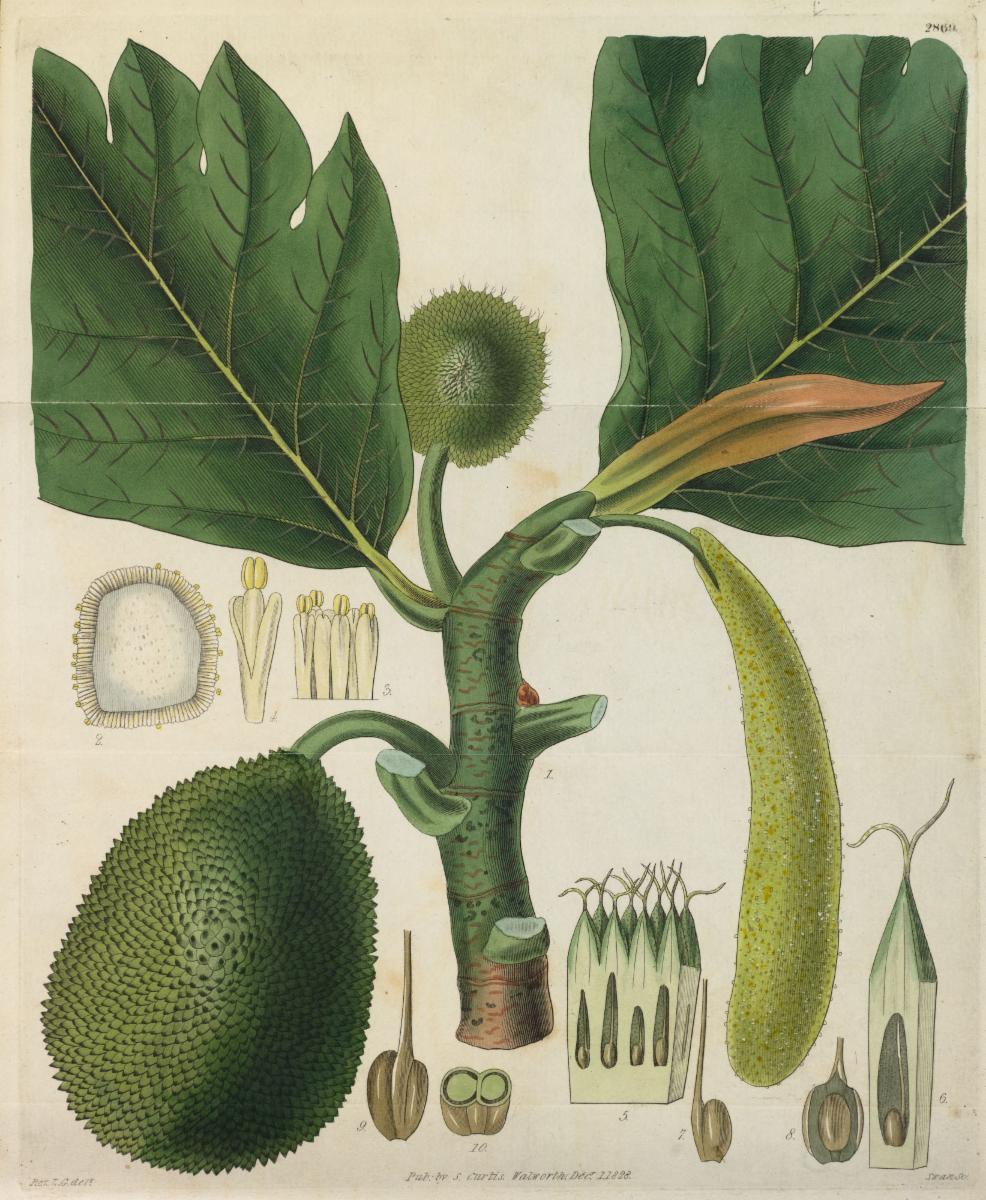
L. Guilding, Artocarpus Altilis, 1828, 1828, Curtis’s Botanical Magazine, http://powo.science.kew.org/taxon/urn:lsid:ipni.org:names:582598-1.
Quotations:
"A mesure que les cannes poussent (jusqu'à dépasser la tête d'un homme) le travailleur frustré regarde ses enfants au ventre lourd, nourris de fruits à pain (mais de fruits verts) et pense, tout au fond, à une plus haute misère, dans des forêts lointaines, révolues." (50)
"As the cane grows (higher than his head) the frustrated laborer looks at his pot bellied children, fed on breadfruit (but fruit that is at least green) and thinks of a greater poverty such as that existing in the primitive forests he has long since left behind." (50)
***
"Soleil, partagé comme le fruit à pain." (74)
"The sunlight, shared like breadfruit, the twinkling sky that greeted them as they came out of the path, as if they were about to plunge into endless transparency." (72)
***
"Le fruit à pain bleu, c'est une ombre ?" (140)
"Is the blue breadfruit a shadow ?" (139)
***
"N'oubliez pas la misère de votre peuple, car c'est lui qui vous a nourris, même si c'est de fruit à pain chaque jour, même s'il n'y avait pas de viande." (166)
"Our people raised and fed you, even if there was no meat, only breadfruit in the larder." (168)
***
"Alors, il faut qu'il lutte pour ça, et le fruit à pain est amer." (227)
"That must be fought... and breadfruit has a bitter savor. ” (229)
Botanical reference: Pedro Acevedo and Mark Strong, “Catalogue of Seed Plants of the West Indies,” Smithsonian Contributions to Botany 98 (January 1, 2012): 567, https://doi.org/10.5479/si.0081024X.98.1.
Coconut / Cocotier
Number of times mentioned: 8
Latin name: Cocos nucifera
Region of origin: Malesia and Pacific Region coastal regions
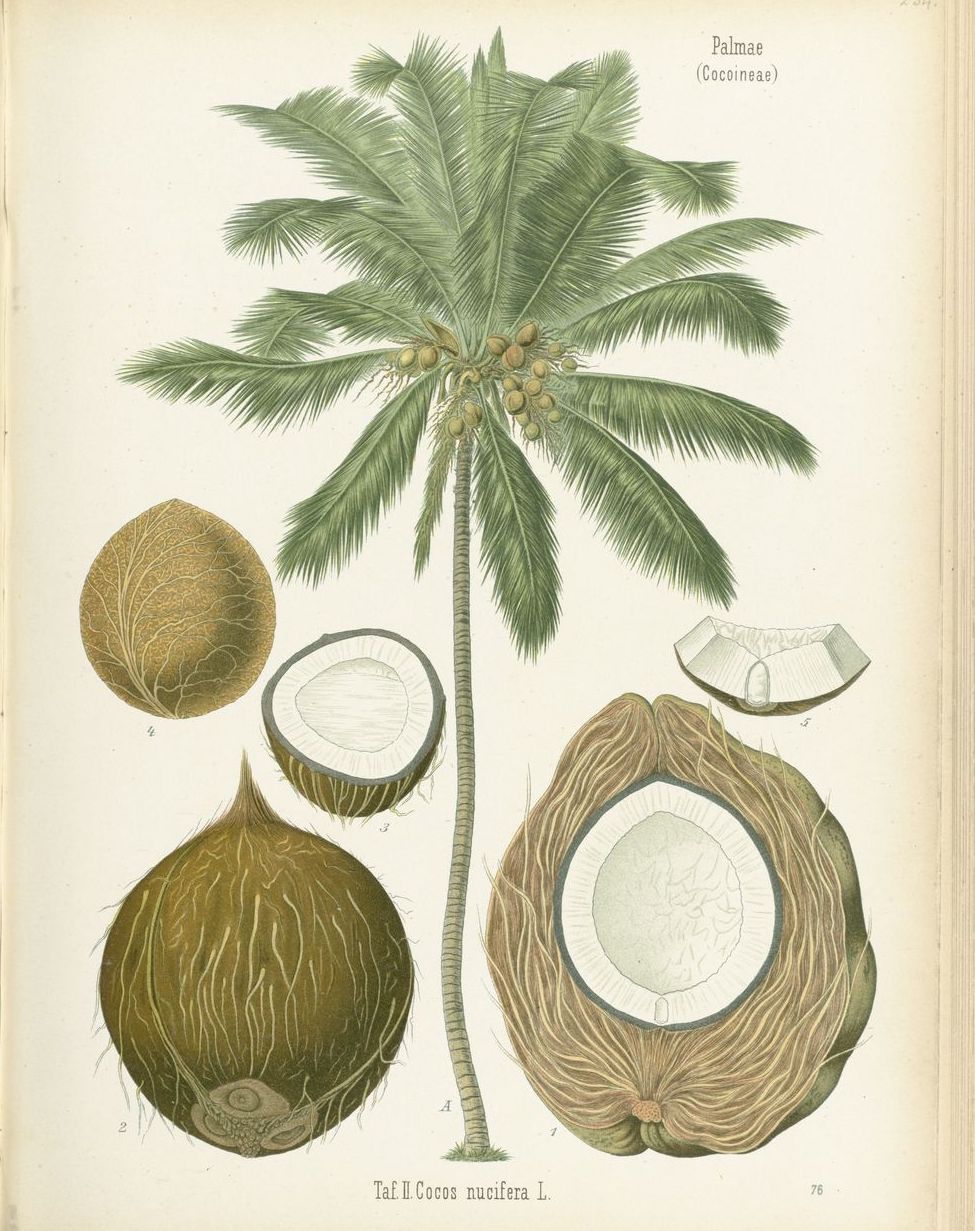
Hermann Adolph Köhler, Cocos Nucifera, 1887, Coloured plate, Medizinal-Pflanzen, Vol. 3., http://powo.science.kew.org/taxon/urn:lsid:ipni.org:names:666160-1.
Quotations:
"Le long des sables, les cocotiers brûlés par le soleil [...]." (43)
"Along the shore stood coconut palms, burned by the sun." (43)
***
"Ils rôdent, complices, derrière l'écran de cocotiers [...]." (144)
"They proceeded stealthily behind the screen of coconut trees, stepping out boldly when there was a stretch of open fields before them." (143-144)
***
"[...] marchant longtemps sur les feuilles sèches, au long du rivage qu'ils devinent, mais reculant vers l'intérieur des terres quand ils rencontrent un mancenillier aux branches torturées, avant-coureur des fresques de raisins de mer mêlées aux cocotiers et qui font à l'eau verte et bleue une parure de fruits." (144)
"Only when they came upon a manchineel tree with its tortuously twisted branches, forerunner of the mingled ephedra and coconuts which made a fruity garland overhanging the green and blue water did they veer momentarily back to the interior." (144)
***
"Là, sous le troisième cocotier, monsieur l'agent." (155)
"Underneath the third coconut tree, Officer." (156)
***
"Le sable, la mer, le vent et les cocotiers se sont figés dans l'étincellement." (156)
"Wind, sea, sand, and coconut trees were all sparklingly still." (157-158)
***
"Les jeunes femmes s'isolèrent dans un recoin de cocotiers, elles s'étendirent sur des feuilles sèches." (199)
"The three young women sought refuge among the coconut trees and lay down on the dry leaves that had fallen to the ground." (202)
***
"Margarita ne put tenir plus longtemps, elle se retourna sur le dos, ouvrit les yeux, regarda fixement les feuilles des cocotiers immobiles." (203)
"She rolled over on her back, opened her eyes and looked hard at the motionless leaves on the coconut trees." (205)
***
"Là, où la vague lapait doucement la plage, à cet endroit si éloigné de la fureur de la barre, près des filets de pêcheurs et des écorces de cocos, dans le calme décor des travaux." (204-205)
"There, where the waves now rolled so gently over the beach, far from the raging fury of the bar, near the fishing nets and the chips of bark from the coconut trees." (207)
Botanical reference: Pedro Acevedo and Mark Strong, “Catalogue of Seed Plants of the West Indies,” Smithsonian Contributions to Botany 98 (January 1, 2012): 75, https://doi.org/10.5479/si.0081024X.98.1.
Filao
Number of times mentioned: 1
Latin name: Casuarina equisetifolia
Region of origin: Tropical Asia, Australia, Pacific

Marianne
North, Round Island and Ile Aride from Long Island, Seychelles, 1883,
Oil Painting, 1883, RBG Kew,
http://powo.science.kew.org/taxon/urn:lsid:ipni.org:names:159856-1.
The filao is located in the foreground at the left.
Quotations:
"L'homme dou cement recule, il sonde (sans connaître qu'en cette façon il agit, perdu là parmi les rêves qu'autour de lui ont levés les palmistes, les filaos peignés par le vent amer, les oiseaux siffleurs), il sonde dans la nuit qu'il enfante, et voici, un songe plus ardent que tous les rêves d'alentour lui vient, un fort relent de piments noirs, un battage torrentiel." (50)
"Man falls gradually back, groping, and failing to real ize that in this way he is lost among the dreams spun around him by the palmettos and filaos combed by the bitter wind, and the whistling birds." (50)
Botanical reference: Pedro Acevedo and Mark Strong, “Catalogue of Seed Plants of the West Indies,” Smithsonian Contributions to Botany 98 (January 1, 2012): 215, https://doi.org/10.5479/si.0081024X.98.1.
Lemon / Citronnier
Number of times mentioned: 3
Latin name: Citrus x limon
Region of origin: Northwestern India
Quotations:
"Ah! les citronniers rabougris... " (28)
"Oh, the stunted lemon trees!" (28)
***
"Elle chante:
Petit citron disait: écrivez-moi
Feuille de citron: rendez la réponse,
car les plus humbles chansons viennent au cœur, lorsque la terre est vide." (140)
"She was singing to herself:
'Little lemon said: Write me a letter;
Lemon leaf echoed: Yes, you' d better....'" (140)
Botanical reference: Julia F Morton, Fruits of Warm Climates, ed. Curtis F. Dowling (Miami, FL: Julia F. Morton, 1987), 160-168.
Malay apple / Pomme d'eau (also known as prune de Cythère)
Number of times mentioned: 2
Latin name: Syzygium malaccense
Region of origin: Southeast Asia, Malesia, Australia and Pacific region
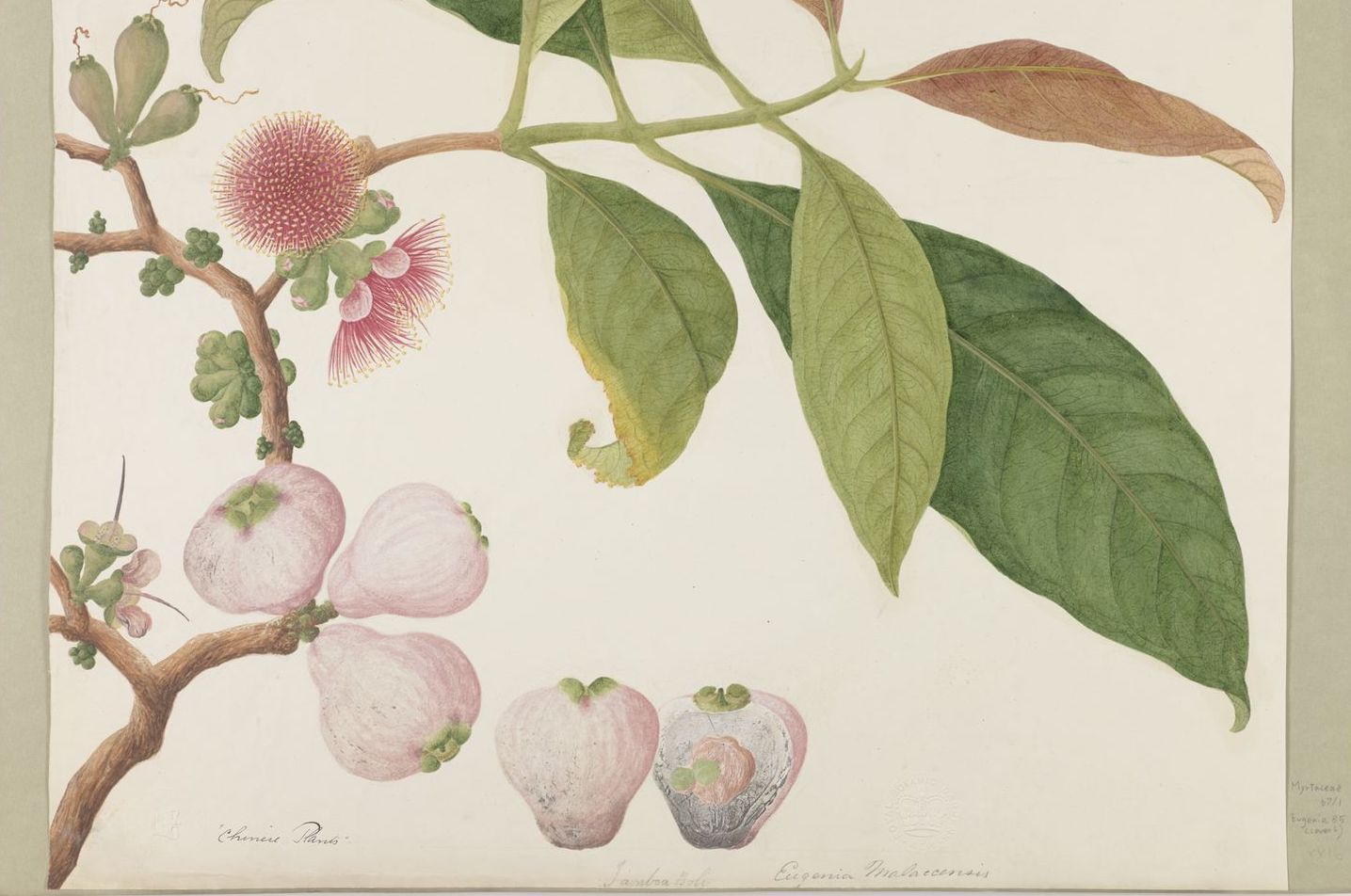 Artist unknown, Eugenia Malaccensis, n.d., Watercolour, n.d., William
Kerr Collection, http://powo.science.kew.org/taxon/urn:lsid:ipni.org:names:601907-1.
Artist unknown, Eugenia Malaccensis, n.d., Watercolour, n.d., William
Kerr Collection, http://powo.science.kew.org/taxon/urn:lsid:ipni.org:names:601907-1.
Quotations:
"La forêt alentour n'était que splendeurs. Des flamboyants à l'orée, comme des sentinelles! Des pommes-d'eau près d'une source, pour saouler l'herbe de cris jaunes." (27)
"The forest, all around, was a mass of splendor, with the flamboyant trees standing like sentinels on its border, and water apples, beside a spring, intoxicating the grass with their yellow cries." (27)
***
"Au dessert (des « prunes de Cythère » en confiture), il était déjà convenu que le mariage aurait lieu dans trois mois." (184)
"By the time they reached dessert (a compote of plums) it had been decided that the marriage would take place within three months, and meanwhile Valérie would go to her betrothed' s mountain place and put it in order." (186)
Botanical reference: Pedro Acevedo and Mark Strong, “Catalogue of Seed Plants of the West Indies,” Smithsonian Contributions to Botany 98 (January 1, 2012): 607-608, https://doi.org/10.5479/si.0081024X.98.1.
Mango / Manguier
Number of times mentioned: 5
Latin name: Mangifera indica
Region of origin: Tropical Asia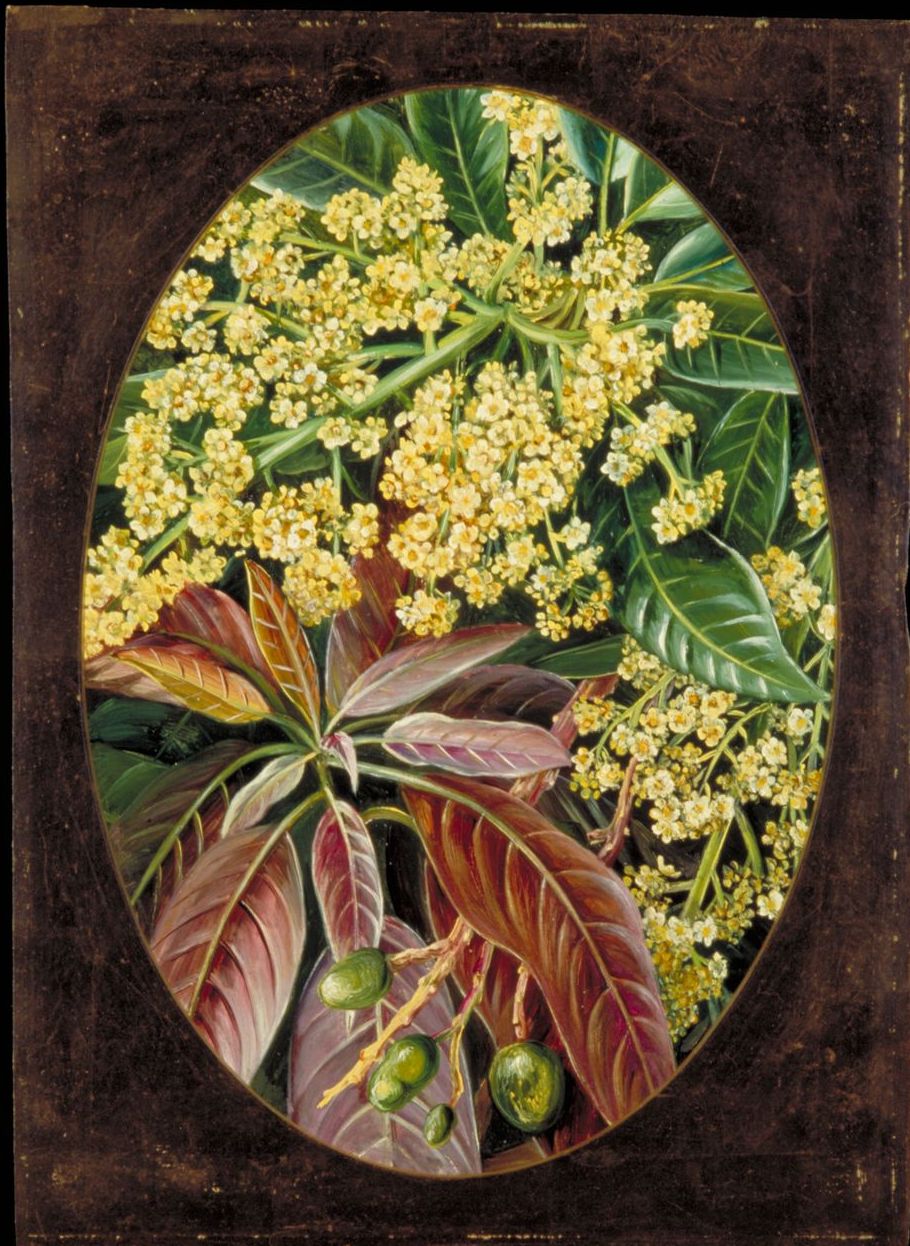
Quotations:
"Et il entendit les cris de son troupeau (il avait pour tant rempli l'abreuvoir); et il lui sembla voir, comme du haut du manguier qui domine la maison, l'échiquier sans ordre des tôles où le soleil joue chaque jour sa partie solitaire et jamais gagnée." (11)
"His little flock was bleating, although he had filled the trough with water before going away, and the sound made him feel as if he were looking down from the mango tree which overhung the house at the patched, sheet-iron roof where every day the sun played its solitary losing game." (11)
***
"Les cathédrales souveraines de la nuit et de la terre s'ouvrent devant la jeune fille aveugle, elle monte par la nef de mystères, entre les lourds manguiers, la profusion des voûtes grimpantes, le hourvari du vent (qui est comme une architecture plus subtile), vers l'autel du matin." (58)
"The great cathedrals of earth and night opened up before this willfully blind young girl; she traversed the nave of mysteries, among the heavily laden mango trees, the overhanging arches of vine, and the uproar of the wind (a subtler kind of architecture) all the way to the altar of dawn." (57)
***
"Mais souvent ils s'échappaient, parce qu'un mango était tombé derrière la maison, ou qu'un oiseau pris à la glu piaillait doucement, ou parce qu'ils étaient impatients d'exercer une nouvelle arbalète (fourche de bois poli au couteau, branches d'élastique taillées dans une vieille et providentielle chambre à air)." (76)
"Often the children ran away, because a mango had fallen behind the house, or a bird, with its feet caught in the sticky molasses, was desperately chirping, or because they wanted to try out a sling made from a fork-shaped piece of polished wood and a strip of rubber cut from the inner tube of a tire." (74)
***
"L'eau court toujours sans raison. Les mangos tombent, qui les ramasse ?" (119)
"Without rhyme or reason the river continues to flow; the mangoes drop to the ground and who picks them up ?" (117)
***
"Mais je criais, la nuit, sur la planche avec les toiles de sac, et croyant voir des étoiles, et croyant entendre frapper quand les mangues tombaient sur le toit, je criais, je criais, et voilà, tu es venu." (148)
"But at night, lying on a board covered with burlap, where I could imagine seeing the stars and took the thud of a mango falling on the roof for a knock at the door, I cried out — and now you are here." (149)
Botanical reference: Pedro Acevedo and Mark Strong, “Catalogue of Seed Plants of the West Indies,” Smithsonian Contributions to Botany 98 (January 1, 2012): 29, https://doi.org/10.5479/si.0081024X.98.1.
Orange / Oranger
Number of times mentioned: 3
Latin name: Citrus sinensis
Region of origin: China, India, Myanmar
Quotations:
"Il appelait ainsi (par réminiscence scolaire) une déclivité abritée entre des orangers aux fruits toujours verts, tapissée de cresson bleu et vouée au silence." (54)
"This was the name which in his schooldays he had given to a quiet and secluded slope sheltered by rows of orange trees — which bore perpetually green fruit — and carpeted with blue water cress." (53)
***
"Mais comment témoigner pour cette splendeur du chemin, crier les orangers, le sel, et la rumeur qui prend ici naissance et, peut-être, va s'élever jusqu'à la dernière étoile là-bas ?" (117)
"How could he bear witness to the magnificence of the road, how extol the odor of salt and oranges, the crescendo of sound which might rise from these roots all the way to the remotest star ?" (115)
***
"Dans ce pays, au fond d'une baie, à l'écart de la mer, loin des passants, des cris, il y a une bande de terre. Tout vert tranquille. Des orangers. Du cresson." (202)
"At the end of an inlet, far from the clamor of cities and the tumult of the sea, imagine a narrow strip of tranquil land, green with water cress and shaded by orange trees." (204)
Botanical reference: Julia F Morton, Fruits of Warm Climates, ed. Curtis F. Dowling (Miami, FL: Julia F. Morton, 1987), 134–42.
Sugarcane / Canne à sucre
Number of times mentioned: 34
Latin name: Saccharum officinarum
Region of origin: Malaysia, New Guinea, Polynesia
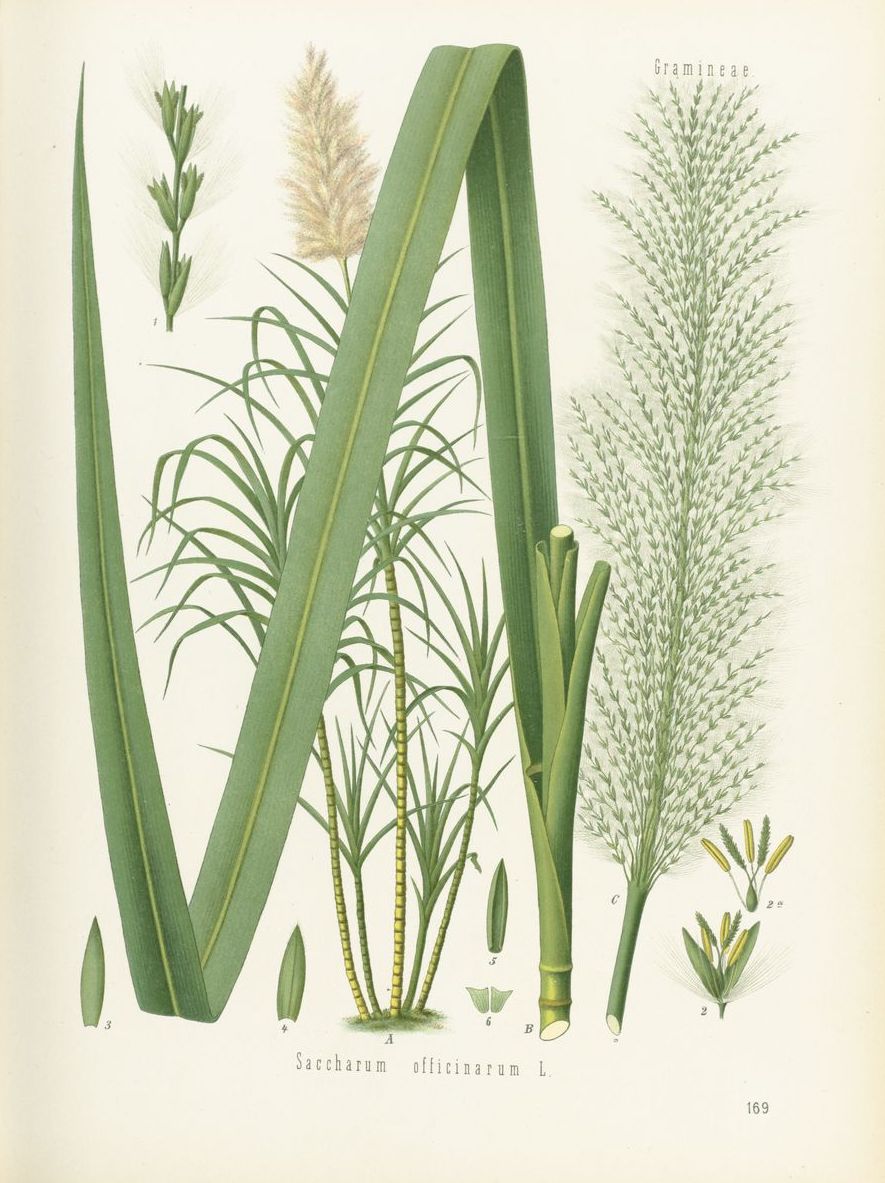 Hermann Adolph Köhler, Saccharum officinarum, 1887, Coloured plate, 1887, Medizinal-Pflanzen, Vol. 2, http://powo.science.kew.org/taxon/urn:lsid:ipni.org:names:419977-1.
Hermann Adolph Köhler, Saccharum officinarum, 1887, Coloured plate, 1887, Medizinal-Pflanzen, Vol. 2, http://powo.science.kew.org/taxon/urn:lsid:ipni.org:names:419977-1.
Quotations:
"Le soleil venait d'apparaître (Thaël l'avait devancé) derrière les remblais énormes auxquels s'agrippaient la route; remblais où les canalisations de métal noir aménagées pour la descente des cannes à sucre semblaient de loin des toboggans, effrayants à force d'avoir été redressés et maintenus droits et rigides." (13)
"On the embankments the black metal chutes for transporting sugar cane were aligned at a terrifyingly vertical angle and looked, from a distance, like toboggans." (13)
"La longue allée de route sans bordure coupait un champ de cannes." (15)
"The road ran, with no trees to border it, straight through a field of sugar cane." (14)
"Les cannes encore jeunes n'entravaient nullement la volée de l'imagination; ni les façades grises là-bas puisque cette ville était le futur pour lui." (15)
"The cane, still not fully grown, did not cut the flight of imagination, nor did the gray façades of the approaching town." (15)
"A l'opposé, la plaine inaltérable, jusqu'aux blancheurs du sud. A l'ouest, la boucle tourmentée de la Lézarde: elle veut emprisonner la cité, mais soudain elle se reprend, elle refuse ce gardiennage, et vers l'est, passé les cannes sinistres, elle se perd dans son delta." (30)
"On the west there was the tortuous Lizard River, trying to surround and imprison the town, then suddenly refusing such a role and turning back to the east, where it ran by the sinister fields of sugar cane and was lost in the delta." (31)
"Ce n'est pas là une menée consciente; mais à mesure que les champs labourés se couyrent de cannes (toujours de cannes), l'homme affamé se souvient d'une plus haute faim, parmi des terres stériles ou profondes, qui lui par laient." (50)
"It is not a conscious design, but as the plowed fields begin to be covered with cane (always cane) a hungry man remembers a greater hunger, endured in a distant fallow land. (50)
"Mais à mesure que les cannes mûrissent, quand les enfants n'y tenant plus s'échappent à la tombée du jour, loin de la case, et vont chaparder un bon bout, au risque de se faire attraper et cravacher par un commandeur (ou, pire, un géreur à cheval) [...]." (51)
"But as the cane ripens the children run down the road at twilight and steal what ever they want, at the risk of being caught by a foreman (or, worse, still, a mounted plantation owner)." (50)
| "A mesure que les cannes poussent (jusqu'à dépasser la tête d'un homme) le travailleur frustré regarde ses enfants au ventre lourd, nourris de fruits à pain (mais de fruits verts) et pense, tout au fond, à une plus haute misère, dans des forêts lointaines, révolues." (50) |
| "As the cane grows (higher than his head) the frustrated laborer looks at his pot bellied children, fed on breadfruit (but fruit that is at least green) and thinks of a greater poverty such as that existing in the primitive forests he has long since left behind." (50) |
"[I]ls sucent le bâton de mort, plus sucré déjà que le café du matin, et ils s'arrachent les lèvres sur l'écorce, et ils s'engourdissent les mâchoires, trompant ainsi la faim, oui, à mesure que les cannes inexorablement mûrissent, le maudit des récoltes sempiternelles doucement s'en va dans une révélation recommencée, dans une récolte nouvelle et séculaire, et sans le savoir, debout là contre la tôle de la cabane, il entre dans la vérité de son soleil." (51)
"They suck at the unhealthy cane, which is even sweeter than their morning coffee, tearing their lips on the rough outer leaves, gumming up their gums, yet somehow allaying their hunger." (50-51)
***
"C'est une ville, un atome de terre, avec tout son entour de cannes, de marais, de mer lointaine, de boues proches." (53)
"It is a town, an infinitesimal point on the globe, with sugar-cane plantations and swamps all around, with the sea in the distance and mud near by." (52)
"La route est assurément sans mystères, elle conduit droit comme fatalité vers le grand carrefour de l'usine: ce qui fait que toute cette rigidité du goudron est pour saluer le chantier de la mort, que toute cette platitude du ciel sur l'éclat noir de la route est pour annoncer la dangereuse banalité des bâtiments de la cuisson; que, dès les dernières maisons de Lambrianne, cette rigidité, cette platitude, cette banalité baignent dans l'odeur de jus brûlé, dans le parfum fade et fruité tout ensemble de la canne." (71)
"Its inflexible macadam strip led straight to a factory of death; the flat sky overhanging the shiny black tar announced no more than the fatally commonplace contours of the vats, and every where there was the odor of scorched juice, the stale, fruity smell of cane." (69)
"Les ouvriers rient doucement, tout baigne dans la suffocation du sucre, les yeux pleurent[.]" (72)
"They laughed gently, but there were tears in their eyes from the fumes of the burning sugar." (70)
"Et ils allaient avec rigueur à la rencontre l'un de l'autre, sans rien qui puisse les séparer: sous la garde des cannes, et dans le ciel plat." (73)
"Under the lowering sky and between the walls of cane they moved inexorably toward their meeting; nothing could keep them apart." (71)
"Puis elle s'arrêta: on n'entendait que les cannes, le vent dans leurs feuilles, les pointes sèches qui craquaient sous le soleil." (73)
"The only sound was that of the wind rustling the cane and crackling the dry, pointed tips, which stared up into the sky." (71)
"Mais elle riait encore, et sur tout le délire, suc la prison de bruits, sur les flèches des cannes mûres, sur la récolte future et sur le vent chaud, il y avait cette splendeur nouvelle, sans pitié ni faiblesse, brûlante et pure pour eux seuls." (73)
"She was still laughing, and over the spears of ripe cane and the hot breeze blowing through the future harvest there was a new splendor, devoid of weakness or pity, burning in all its purity for them alone." (71)
"C'est ainsi que leur vint cette habitude de se rencontrer dans le sen tier entre les cannes; seuls, et se voyant venir de loin; et toujours Valérie s'arrêtait la première." (75)
"And so they acquired the habit of meeting on the path that ran through the cane." (73)
"Lorsque je pense à cette histoire (et elle me marque, m'atteint), je me reporte dans ce sentier que j'imagine toujours bordé de cannes, je vois grandir l'ombre qui est en moi, et je lui parle doucement." (75)
"When I think back to this story, which has left such a mark upon me, I immediately picture the path, bordered on either side by sugar cane." (73)
"Je m'interdis avec patience d'aller là-bas après la récolte; le sentier est alors livré aux deux champs qui le bordent, ce n'est plus qu'un passage entre des la bours, je m'y sens nu, livré impuissant aux désespoirs (comme si les cannes étaient nécessaires, par contrecoup, à l'assurance de celui qui les déteste et les combat)." (75)
"It is as if the cane were paradoxically necessary and reassuring to the very man that detests and combats it." (73)
"Garin ne veut pas voir les profondeurs basses des cacaoyers, silencieux sur leurs tapis de feuilles pourries; les carrés de patates douces, les mornes frémissants, et à mesure que l'on prend vers le sud, quittant la montagne, les champs de cannes de plus en plus serrés." (98-99)
"He had no eyes for the depressions studded with cacao trees, erect on a carpet of decaying leaves, the fields planted with sweet potatoes, the green hillocks in the distance, and, farther down, on the plain, the increasing sugar cane agglomerations." (96)
"La nuit est claire; ils vont par des chemins détournés, coupant à travers les champs de cannes[.]" (122)
"They traveled by branching paths across the fields of cane." (121)
"On a dit ce soir dans tous les détails le malheur de notre peuple. Sous-alimentation. Salaires de famine. La canne qui dévore. L'absence de débouchés. Rien." (133)
"In the course of the evening, he said, every detail of our woes had been mentioned: malnutrition, starvation pay, excess crops of sugar and no demand for them on the world market." (132)
"Et plus loin l’amon cellement de crêtes et de fonds, les mornes qui se chevauchent jusqu'au bout, tantôt vert pâle de canne, tantôt sombres, portant la pluie, tantôt rouges, tondus par l'homme, jusqu'au plus loin du regard — et l'horizon n'existe pas, il n'y a pas de limite à cette cascade de sommets, et l'infini (ici plus encore que devant les plaines immenses des atlas) surgit du fond même de l'oeil et plane sur le carrousel." (150)
"Farther away there were ridges and valleys, some of them pale with cane, some darker because rain clouds hung over them, others red because men had cut down their vegetation and bared the clayey earth below." (151)
"[Q]uand on pense à ce que nous sommes, des bêtes à cannes tout ce peuple, et méprisé, exilé, et nous, contents, fats, béats, nous les petits rois, qui d'entre nous peut dire: « J'ai souffert » ? " (176)
"When you stop to think what we really are, slaves to sugar cane, every last one of us, sad exiles from humanity, and yet which member of our little group, claiming to be kingmakers, can honestly say:'I have suffered'?" (178)
"Tout cela, Thaël le sentit sur cette route, dans l'odeur brûlée,.. de la canne, et il n'eut d'autre recours que de penser à Valérie." (181)
"Here on this road, amid the smell of burnt sugar, Thael under stood all these things, and he could not but think of Valérie." (183)
"Thaël (une fois encore) se jeta dans le sentier entre les cannes, dans la prison de sueur de sucre, de dividendes, de salaires misérables, d'ignominies et d'exploitations montées sur pied de verdure [...]." (182)
"Once more Thael went down the path between the rows of cane, the prison of sugar-sweat, of meager salaries and fat dividends, of ignominy and exploitation." (184)
"Une autre fleur, la plus belle, comme une seule flèche de canne sur tout un champ planté." (202)
"One flower in particular, standing out above all others, like an arrow of sugar cane in a field of vegetables." (205)
"Une grande rigole, un toboggan, mais il n'y tombait pas de la canne!" (214)
"It was a hilarious toboggan slide, only there was no sugar cane falling from above." (217)
"« Pas canne à sucre! »" (225)
"Nothing to do with sugar cane, I can tell you that!" (228)
"Je n'irai pas planter des légumes, combattre la canne! Je ne fais pas des recherches savantes." (227-228)
"I shan't plant vegetables to take the place of cane; I don' t go in for scholarly research." (230)
"Ils virent au loin, sur la gauche, la petite distillerie, annexe de la grosse usine, par quoi le rhum et le sucre achevaient d'entenailler les maisons." (235)
"On the left they saw in the distance the small building which housed the distillery, side by side with the large sugar refining plant, which had such a complete hold on the island' s economic system." (237)
"Et avant, je voyais tous ces champs de cannes du haut de mon quartier, mais en vérité je ne les voyais pas, je ne savais pas ce qu'ils signifiaient." (236)
"All along the way there were fields of sugar cane, but I didn' t see them or know what they meant." (238)
"Quand je suis arrivé, les cannes par ici étaient jeunes, on pouvait encore suivre les alignements jusqu'au fond." (236)
"Yes, when I first came by, the cane was young and I could distinguish the rows one from another. (238)
Botanical reference: N. Parthasarathy, “Origin of Noble Sugar-Canes (Saccharum Officinarum.),” Nature 161, no. 4094 (April 1, 1948): 608–608, https://doi.org/10.1038/161608a0
Teak / Bois d'Inde
Number of times mentioned: 1
Latin name: Tectona grandis
Region of origin: India, Laos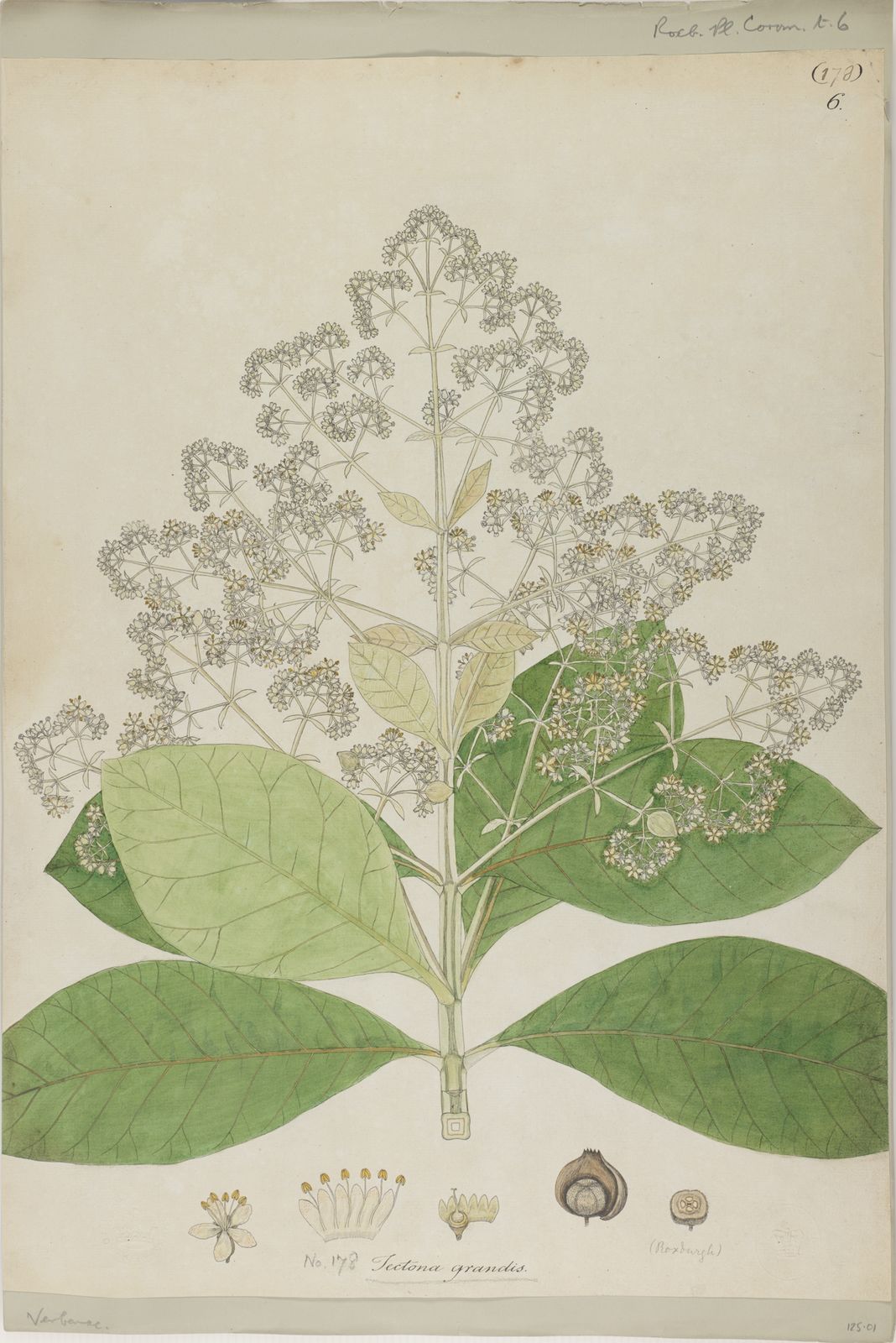 Tectona Grandis Illustration, 19th century, Watercolor
on paper, 19th century,
http://powo.science.kew.org/taxon/urn:lsid:ipni.org:names:864923-1.
Tectona Grandis Illustration, 19th century, Watercolor
on paper, 19th century,
http://powo.science.kew.org/taxon/urn:lsid:ipni.org:names:864923-1.
Quotations:
"Et peut-être Mycéa, à force d'être vidée de son être, dans tout ce silence qui la résume parfaitement, perçoit-elle la succion acharnée de l'océan, sa rage d'attirer, d'emporter et qui, en effet, emporterait tout (les mornes, les labours noirs, et l'odeur brune du bois d'Inde, les chiens gris sombre) si de l'autre côté la mer tranquille ne retenait par tous les subterfuges de la séduction." (59)
"Perhaps, amid this silence so closely akin to her innermost self, Mycéa perceived the magnetic power of the sea, its eagerness to attract and carry away the soul, just as it would carry the cliffs, the black plowed soil, the dusky odor of teak and the gray dogs, that is, if, on the opposite side of the island, the same sea did not deploy all its powers of seduction to hold them back." (58)
Botanical reference: Daniel Verhaegen et al., “What Is the Genetic Origin of Teak (Tectona Grandis L.) Introduced in Africa and in Indonesia?,” Tree Genetics & Genomes 6, no. 5 (2010): 717, https://doi.org/10.1007/s11295-010-0286-x.
Basil / Albahaca
Text
Basil / Albahaca
Text
Basil / Albahaca
Text
Basil / Albahaca
Text
Basil / Albahaca
Text
Basil / Albahaca
Text
Basil / Albahaca
Text
Basil / Albahaca
Text
Basil / Albahaca
Text
Basil / Albahaca
Text
Basil / Albahaca
Text
Basil / Albahaca
Text
Basil / Albahaca
Text
Basil / Albahaca
Text
Basil / Albahaca
Text
Basil / Albahaca
Text
Basil / Albahaca
Text
Basil / Albahaca
Text
Basil / Albahaca
Text
Basil / Albahaca
Text
Basil / Albahaca
Text
Basil / Albahaca
Text
Basil / Albahaca
Text
Basil / Albahaca
Text
Basil / Albahaca
Text
Basil / Albahaca
Text
Basil / Albahaca
Text
Basil / Albahaca
Text
Basil / Albahaca
Text
Basil / Albahaca
Text
Basil / Albahaca
Text

Tomás Sánchez, Autorretrato En Tarde Rosa, 1994, Acrylic on linen, 1994,
https://www.thisiscolossal.com/2020/03/tomas-sanchez-landscape-paintings/.
Tomás Sánchez, Orilla y Cielo Gris, 1995, Acrylic on canvas, 1995,
https://www.thisiscolossal.com/2020/03/tomas-sanchez-landscape-paintings/.
Text editions:
Édouard Glissant, La lézarde: roman (Paris: Editions du Seuil, 1958).
Édouard Glissant, The Ripening, trans. Frances Frenaye (New York: G. Braziller, 1959).